2017 Polaris 550 Indy Review
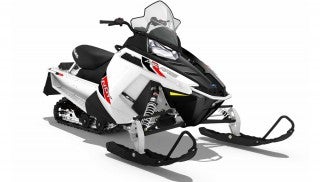
Polaris fan favorite
With age comes wisdom? How about a heightened sense of what’s important and what just isn’t important? This writer welcomes that wisdom, if that’s what it is, because it makes it so much easier to accept my absolute joy in riding Polaris’ 550 Indy. In our modern age of newness, the 550 Indy reflects that crossroads where snowmobiling was advancing from an iconoclastic sport where all sleds were powered by two-strokes and required that you sit over the rear idlers to the revolutionary world of ride-forward, liquid-cooled four-strokes and computerized engines, exhausts, steering and suspensions. The 550 Indy bridges that old and new world.
Engine Type:Horizontal In-line
Cylinders:2
Engine Stroke:2-Stroke
Valve Configuration:Reed Valve
Displacement:544 / 33.2
Starter:Pull
Turbocharged:No
View Full SpecFrom the old world, the 550 Indy retains a fan-cooled two-stroke twin complete with dual Mikuni carburetors. No electronic fuel injection for this sled. You still need to flip a fuel enriching choke lever for cold starts. Electric start is useful, but optional. Push-button electronic reverse is standard and pays homage to the modern era of electronic gizmos.
Even the latest way to get the 550 Indy’s 55-plus horsepower to the track is not so new. Those CVTech drive and driven clutches date back to the 1970s when they were a true alternative to stock designs. Improved over the decades since, the current CVTech PowerBloc 50 drive and Invance driven work exceedingly well with the Fuji-built 544cc twin. Reliable and easy to maintain, they work well enough that Polaris no longer uses a version of its own long-proven P85 driver. Of course, that Polaris faith in the CVTech drive comes from years of working with the Quebec-based firm on various wheeled products. And, of course, we’re talking only 50-plus horsepower. The similar but US$1600 more expensive and higher powered 600 Indy gets fitted with the Polaris P85 drive clutch and TEAM-developed lightweight driven.
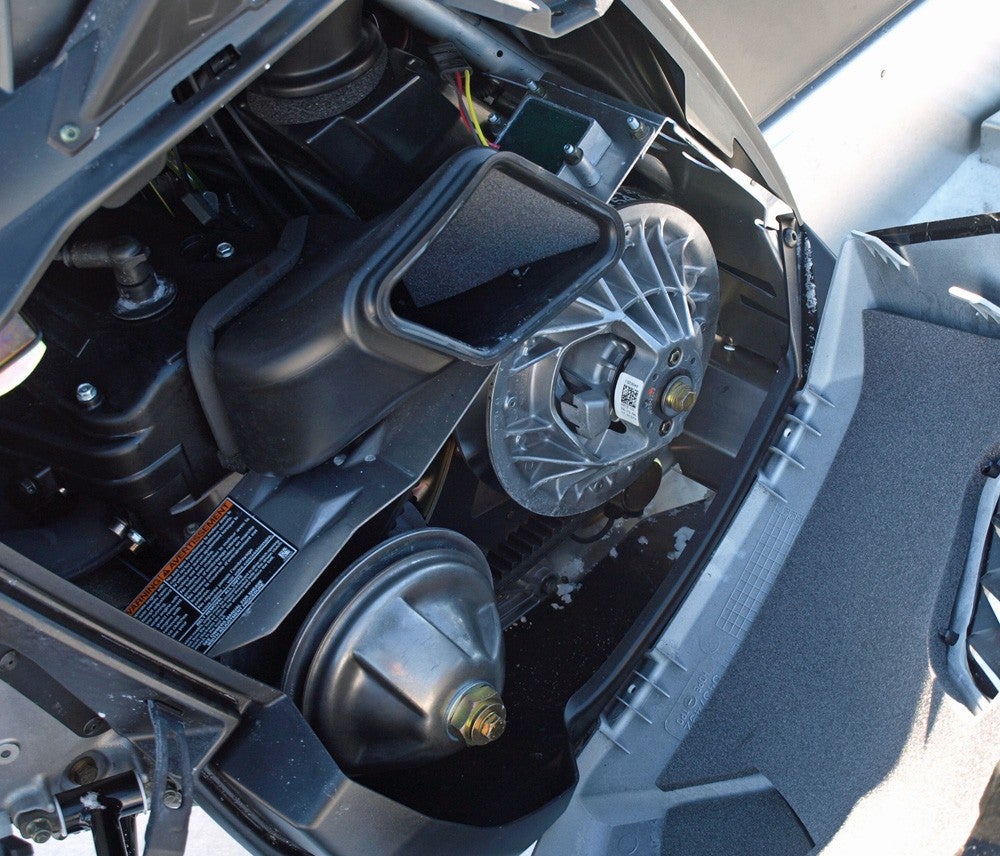
Reliable and easy to maintain, the CVTech PowerBloc 50 drive and Invance driven work exceedingly well with the Fuji-built 544cc twin.
At US$6,799 the 550 Indy offers good value as it uses contemporary design, a modern version of the newer Polaris Pro-Ride double A-arm front suspension and a coupled rear suspension that allows nearly 14 inches of bump-absorbing travel. The front skis are the latest Pro-Steer design to provide good grip from this 422-pound sport sled. Light and nimble, the 550 Indy won’t be mistaken for a US$12,799 Polaris Rush on the trail, but riders with experience and modest egos will find the 550 Indy surprisingly fun to ride, especially in tight, forested areas where handling trumps sheer horsepower.
What we like about the Polaris 550 Indy is what we like about all of the modern 550 fan-cooled models. That lack of liquid-cooling immediately reduces weight out over the skis, meaning lighter and less tiring steering efforts. Those Pro-Steer skis bite well even with less weight up front.
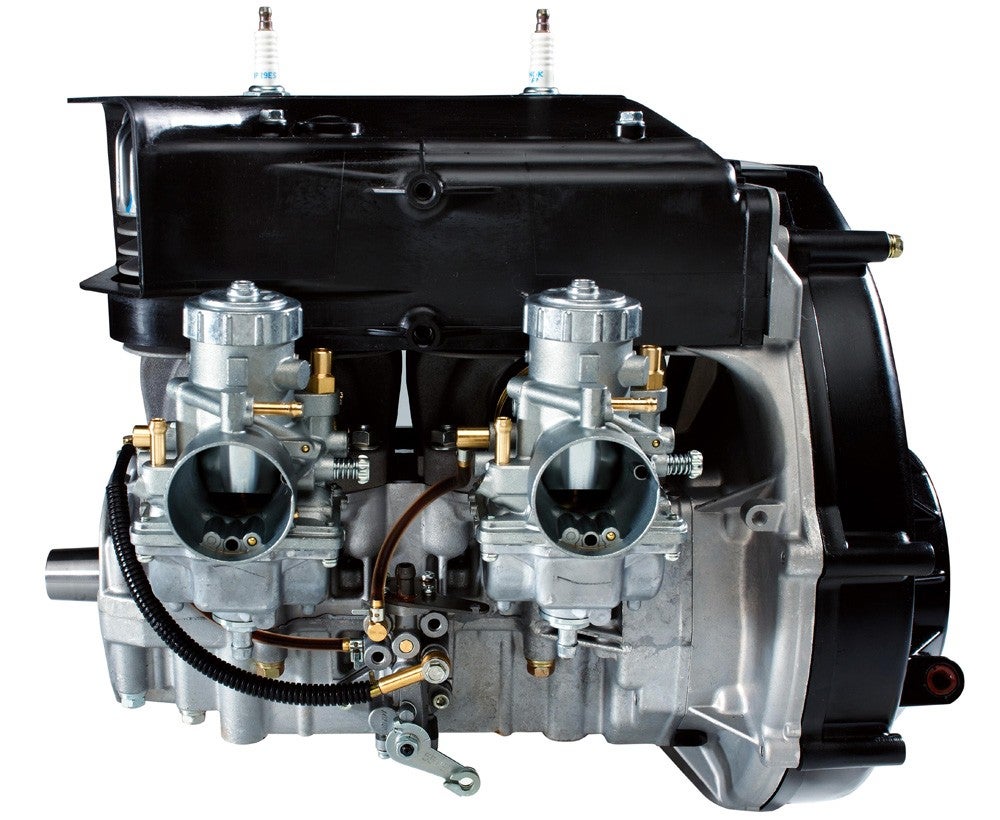
The 544cc Fuji-built fan-cooled twin develops about 55 horsepower and is the heart of the Polaris Indy value series of sleds.
We appreciate the Indy’s ride-forward chassis and rider placement. When Ski-Doo’s REV platform essentially reinvented the snowmobile, all other manufacturers developed a version of their own. Granted, the 550 Indy does not reflect the latest of Polaris’ ride forward platforms, but it works extremely well with this 550cc drivetrain. Mounted atop the Indy Pro-ride seat, you can easily slide forward and off to the side to aggressively corner at speed. Or you can slip back on the saddle and cruise comfortably on a family-friendly club ride.
Not that you bought the 550 Indy to go racing, but you can appreciate the race-inspired character of the Indy front end. If you do push the sled hard for a prolonged time, you’ll find that the base RydeFX MPV shocks may fade, making you wish for a stiffer set of shocks. You can update the sled with better shocks, but for most riders the sled will be more than adequate with the stock set. Likewise, you may find the lack of racer-style curved handlebar ends detracts from running hard in tight trails. But the stock setup reflects an upgrade from the original 550 Indy, which did not have the advantages of the newer 15-degree flatter steering post angle expressly designed to make transitioning from sitting to standing up easier.
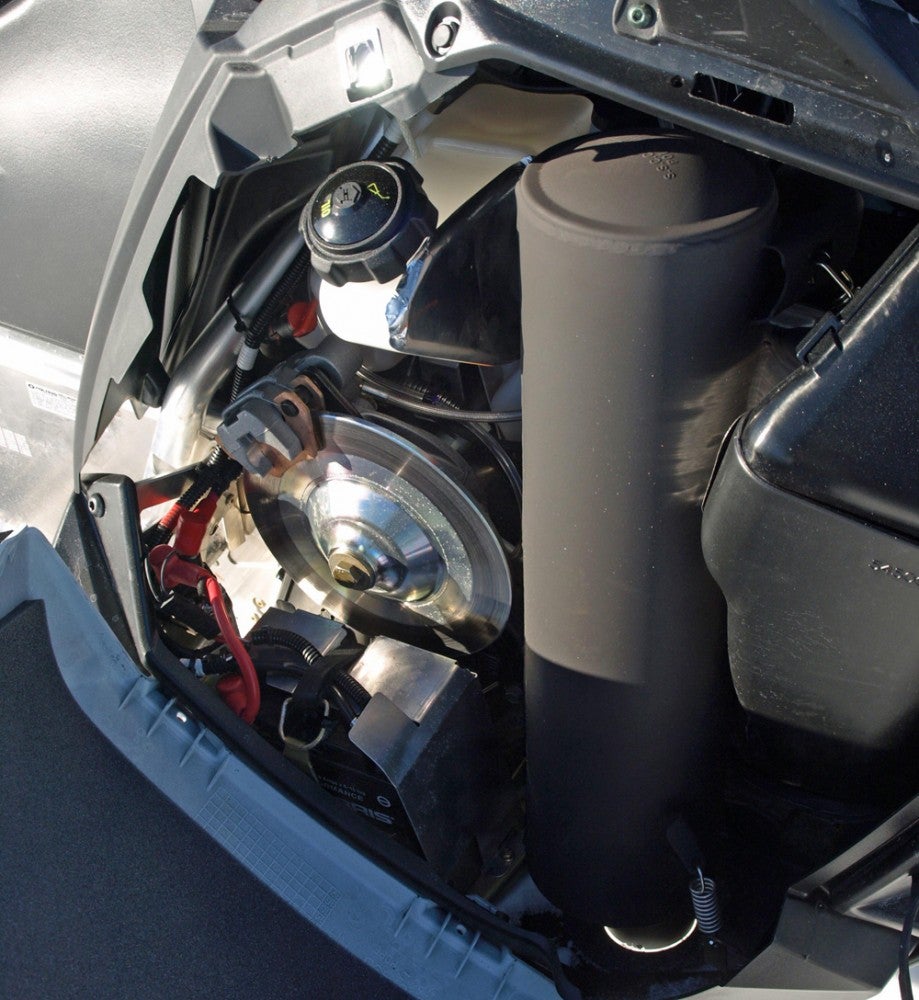
The 544cc two-stroke twin features a simple two-into-one exhaust that dumps into a sound-deadening canister-style exhaust. Note the low-mounted hydraulic disc brake system.
Perhaps we are a bit off-kilter with our fondness for this sled. Last winter we enjoyed our time, albeit limited, with a 550 Indy. What is it about this sled? It certainly isn’t the quietest of snowmobiles, what with its looser internal construction tolerances that help the sled cool better. There’s no water jacketing to insulate engine sounds, either. When you flip the choke you can see two-stroke smoke and the smell will infect your snowsuit, providing a reminder of the old days.
The 550 Indy carries a relatively modest price tag at US$6,799, but it’s more than that. The sled is undeniably fun to ride. It’s easy to load and off load from a trailer. It sits you well, upright and in a position to readily see and study the trail ahead through its 14.5-inch tall mid-height windscreen. The hand and thumb warmer controls work easily. Even the throwback gas gauge for the 11.5-gallon fuel tank can be read quickly. This sled is a value in pricing but offers overall value to the buyer looking for simple, reliable snowmobiling. Fast? Not especially, but you can exceed many trail speed limits if you aren’t careful. The most comfortable? Not really, but its 13.9 inches of rear travel compare favorably with some much more expensive models such as these 2017s: Polaris Switchback Pro-S, 13.4 inches of travel; Arctic Cat Thundercat, 13.5 inches; or, Ski-Doo MXZ TNT 850, 10.7 inches of rear suspension travel. Of course, they all have superior shock packages, but the low buck 550 Indy with its RydeFX MPV shocks will require minimal tuning.
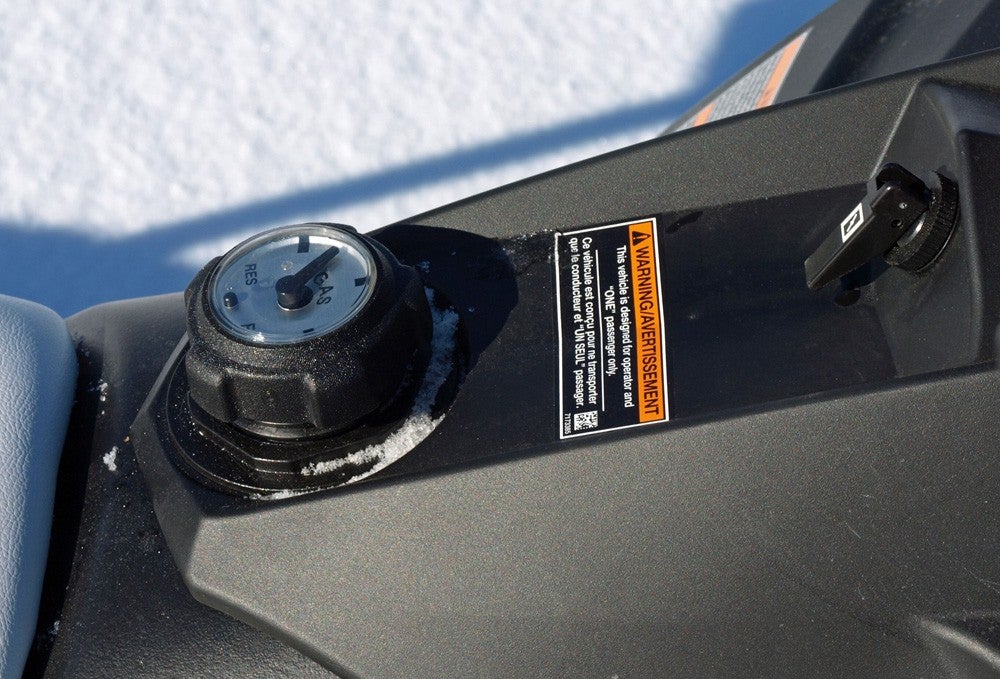
The flip lever tells you this is a fan-cooled sled. The throwback easy to read fuel gauge tells you exactly what your fuel situation.
While we like the 550 Indy, we can think of a few ways to make it better for us. We’re sure that Polaris hears “what ifs” like ours on a daily basis. But, if we were to retire from our day job and just plan to buy a sled for the next however many seasons of snowmobiling we can squeeze in, we’d start with the 550 Indy. But we’d try to find a moderately priced set of front shocks like the Fox IFP ones that would work with minimal fade. Since we vastly prefer its ergonomics, we’d also fit the one-piece handlebar that comes standard with the 600 Indy SP on our 550 Indy. While we’re at it, we’d specify a different 121-inch track, probably a Ripsaw with the 1.25-inch lug profile. And, of course, we might add some bags, a bit of dazzle like a wrap and other personalization.
Overall, though, the 2017 Polaris 550 Indy is a loyal fan and has a loyal fan in this writer. With age comes the wisdom to recognize that on a sheer value basis the 2017 Polaris 550 Indy is hard to beat. On a smile to mile of riding basis, it can’t be beat. It’s a fan favorite.
| 2017 Polaris 550 Indy Specs | |
| Engine | Polaris 544cc twin cylinder 2-stroke; fan-cooled; Twin Mikuni VM34 carburetors with dash-mounted choke; two-into-one exhaust; CD ignition |
| Horsepower | 55 (estimated) |
| Drive | CVTech PowerBloc 50 drive with Invance driven clutch |
| Front Suspension | Pro-Ride dual A-arm with RydeFX MPV shocks; 7.1-inches of travel; Pro Steer skis |
| Rear Suspension | Indy parallel rail coupled slide suspension with RydeFX MPV rear suspension shock; 13.9-inches of travel |
| Length | 114.0 in |
| Width | 48.0 in |
| Height | 48.0 in |
| Ski Stance | 42.5 in |
| Track | 15 x 121 x 0.91 Shockwave |
| Weight | 422 (claimed dry weight) |
| Brake | Polaris RMK hydraulic disc system |
| Fuel Capacity | 11.5 US Gal |
| Features | STANDARD: Pro-Steer skis; electronic reverse; Indy Pro-Ride seat; digital speedometer/tachometer display; 3.5-inch fixed riser; Pro-Ride 14.5-inch mid-height windshield OPTIONS: electric start, Lock & Ride storage options; mirrors; racks, tow hitch |
| MSRP | US$6,799/C$8,199 |








 Your Privacy Choices
Your Privacy Choices